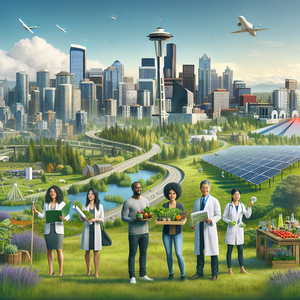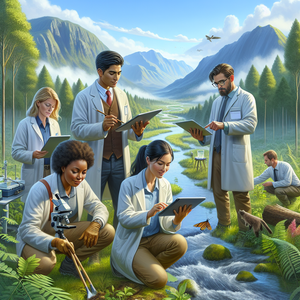The Green Revolution: Careers in Sustainability and Environmental Science

The urgency of climate issues has galvanized a variety of sectors to prioritize sustainability. According to the Bureau of Labor Statistics, jobs in the renewable energy sector are projected to grow significantly, with solar and wind energy jobs expected to increase by 61% and 61% respectively by 2029. This demand is not limited to traditional environmental science roles; it encompasses a variety of fields such as urban planning, agricultural innovation, and corporate sustainability. Companies across industries are recognizing the importance of sustainable practices, leading to the creation of roles focused on reducing carbon footprints, managing waste, and ensuring compliance with environmental regulations. For instance, large corporations like Microsoft and Google are investing heavily in sustainability initiatives, hiring experts to develop strategies that reduce their carbon emissions and improve energy efficiency. This trend demonstrates that sustainability is becoming integral to business practices, reflecting a shift in how industries operate and the skills they require.
Diverse Opportunities in Sustainability
Renewable energy specialists play a crucial role in the transition from fossil fuels to sustainable energy sources. They work on the development, installation, and maintenance of renewable energy systems, such as solar panels and wind turbines. As the demand for cleaner energy continues to rise, professionals in this field are essential for creating efficient, alternative energy solutions.
Environmental Scientists
Environmental scientists are tasked with studying the environment and developing solutions to environmental problems. Their work involves assessing the impact of human activity on the planet and advising policymakers on necessary actions. By providing crucial data and analysis, these scientists help shape effective environmental policies.
Sustainability Consultants
Sustainability consultants work with businesses to develop and implement sustainability strategies. They help organizations improve their environmental practices, enhance their brand reputation, and reduce costs through efficient resource management. This role is particularly relevant as brands increasingly recognize the importance of sustainability in attracting and retaining customers.
Urban Planners
Urban planners focus on creating sustainable cities. They design spaces that promote environmental health, including green spaces, efficient public transportation, and sustainable housing solutions. As urban populations grow, the need for sustainable urban development becomes more pressing, making this career path increasingly vital.
Environmental Educators
Environmental educators play an essential role in raising awareness and educating communities about sustainability practices. They foster a culture of environmental stewardship by teaching individuals about the importance of protecting natural resources and adopting sustainable behaviors.
Supporting Evidence and Examples
One compelling example of the impact of careers in sustainability can be seen in the rise of electric vehicle (EV) manufacturing. Companies like Tesla have not only revolutionized the automotive industry but have also spurred job creation in engineering, manufacturing, and supply chain management focused on sustainable practices. The EV market alone is projected to create millions of jobs globally, reflecting a significant shift in consumer preferences towards eco-friendly transportation. Moreover, the construction industry is increasingly embracing green building practices. The U.S. Green Building Council reports that buildings certified under the Leadership in Energy and Environmental Design (LEED) rating system have seen a substantial increase. This growth indicates a burgeoning market for professionals skilled in sustainable architecture and construction, highlighting the integration of environmental considerations into mainstream building practices. Additionally, the growing popularity of remote work has allowed individuals to pursue careers in sustainability across diverse geographic locations, further expanding the workforce dedicated to environmental initiatives.
The Green Revolution represents a pivotal moment in the job market, as careers in sustainability and environmental science become not just desirable but essential. With the growing urgency to address climate change, professionals in this field are at the forefront of creating innovative solutions for a sustainable future. As more individuals seek to align their careers with their values, the demand for green jobs will continue to rise, offering fulfilling opportunities that contribute positively to society and the environment. For those looking to make a meaningful impact, pursuing a career in sustainability is not only a wise choice but a necessary one for the future of our planet. In conclusion, as the most popular career in America evolves, a significant shift toward green careers is evident, ushering in a new era of professional opportunity that prioritizes environmental stewardship and sustainability. Engaging in this revolution not only enhances individual career prospects but also contributes to the collective effort to protect and preserve our planet for future generations.
Solar Energy Engineer
SunPower, First Solar, Tesla
Core Responsibilities
Design and implement solar energy systems and photovoltaic installations.
Conduct site assessments to determine the feasibility and efficiency of solar projects.
Collaborate with project managers and construction teams to ensure successful installation and integration.
Required Skills
Proficiency in CAD software and solar design tools.
Strong understanding of electrical systems and renewable energy technologies.
Experience with energy modeling and performance analysis.
Climate Policy Analyst
World Resources Institute, government agencies, think tanks
Core Responsibilities
Research and analyze data related to climate change and environmental regulations.
Develop policy recommendations to support sustainability initiatives at local, state, or national levels.
Collaborate with legislators, NGOs, and stakeholders to promote effective climate action.
Required Skills
Strong analytical skills with a background in environmental science or public policy.
Excellent communication skills for presenting complex data to diverse audiences.
Familiarity with environmental legislation and regulatory frameworks.
Sustainable Supply Chain Manager
Unilever, Patagonia, Walmart
Core Responsibilities
Oversee the procurement and logistics processes to ensure sustainability goals are met.
Evaluate suppliers based on their environmental practices and sustainability certifications.
Implement strategies to reduce waste and carbon emissions throughout the supply chain.
Required Skills
Strong project management skills with expertise in supply chain logistics.
Knowledge of sustainability certifications and standards (e.g., ISO 14001).
Experience with data analysis and reporting tools to track sustainability metrics.
Green Building Architect
Gensler, Perkins+Will
Core Responsibilities
Design environmentally sustainable buildings that meet LEED certification standards.
Collaborate with clients to create energy-efficient and eco-friendly designs.
Conduct energy audits and assessments for existing buildings to recommend improvements.
Required Skills
Proficiency in architectural design software and green building practices.
In-depth knowledge of sustainable materials and energy-efficient technologies.
Strong communication and teamwork skills for collaborating with contractors and clients.
Wildlife Conservation Biologist
World Wildlife Fund, The Nature Conservancy, government wildlife agencies
Core Responsibilities
Conduct field research to study wildlife populations and their habitats.
Develop and implement conservation plans to protect endangered species and ecosystems.
Collaborate with government agencies, NGOs, and local communities to promote biodiversity.
Required Skills
Strong background in biology or ecology with field research experience.
Proficiency in data collection and statistical analysis software.
Excellent problem-solving skills and the ability to work in diverse environments.


